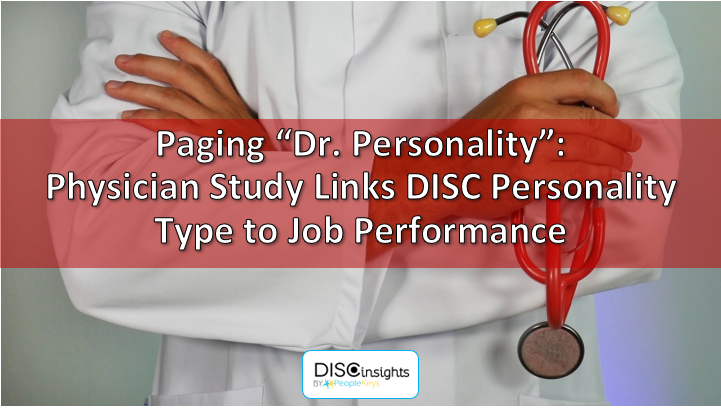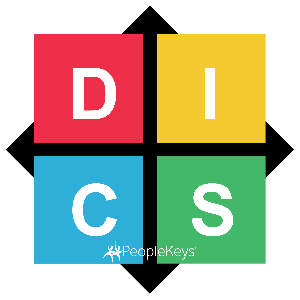- SHOP BY PRODUCT
- DISC TRAINING & CERTIFICATION TOOLS
- DISC RESOURCES
- BLOG
- SHOP BY PRODUCT
- DISC TRAINING & CERTIFICATION TOOLS
- DISC RESOURCES
- BLOG
- ALL ITEMS



A recent article posted on physician staffing website Jackson & Coker discussed the results of a year-long research project focused on cataloguing the personality types of physicians. The project hinged on a DISC personality test that was administered to a large group of doctors and medical professionals. The study looked at the connection between personality type and job performance in the medical field, and attempted to find answers to three important questions:
1) Do different medical specialties attract physicians that share common personality traits?
2) When physicians work closely with individuals that share their own personality traits, does it have an impact on their job performance?
3) Can personality type be used to predict a doctor’s innate strengths in their clinical setting?
After amassing and assessing the data from the personality tests, it became clear that in the medical field there is a very direct link between personality type and job performance.
The answer to question 1: No.
Interestingly, the results of the personality study were not what the researchers at Jackson & Coker had initially predicted. Physicians within a particular specialty do not share a common personality type across the board. In other words, not all radiologists have a high C personality, and not all surgeons are personality type D. Individuals within a medical specialty typically tend to have very different personalities from one another, each with different approaches, strengths, and weaknesses. This shouldn’t be surprising to those that have studied DISC, though, as we know that personality is inherently complex. Though one medical specialty may attract many different personality types, all will come to the profession for different reasons, and bring along different innate gifts, aptitudes, and challenges. By understanding the complexities of the DISC personality system, those strengths and weaknesses become easier to identify and harness.
The answer to question 2: Yes.
When people with the same personality type work together, yes, job performance is affected. However, whether that impact is positive or negative is entirely a result of the specific personalities being combined. For example, dominant and direct D personalities will typically butt heads with one another, while easygoing S personalities get along well.
The answer to question 3: Yes.
Personality type can most definitely be an indicator of a physician’s innate strengths and weaknesses. This theory is confirmed by the results of the Jackson & Coker study. It is also something we at PeopleKeys have based our own research on, the findings of which form the basis of our PerfectMatch Hiring for Medical Practices package. When individuals in the medical field are typed by DISC personality style, it immediately gives supervisors, colleagues, and HR departments the tools to better understand a physician’s needs, limitations, strengths, and motivations. Insights from DISC personality tests lead to improved communication, the ability to better place the physicians in groups or teams, the ability to manage physician expectations, to understand decision-making process, and the ability to find clear motivational triggers. DISC can be a valuable tool in the hiring process as well, as personality type can shed more light on the potential effectiveness of a candidate for a position than a resume ever could.
In the Jackson & Coker article, Dr. Jerry Titel, Medical Director of Premier Anesthesia goes on to explain more about the importance of DISC in the medical field:
[DISC] helps to promote effective communication and team work among members of a workplace or medical group. Increased self-awareness of your own personality style facilitates greater understanding of what behavioral changes need to be made to improve communicating and working with others. Similarly, by understanding the key personality traits of other individuals in the group, you can relate to them more positively and effectively.
When members of the group better understand one another’s ‘hot buttons,’ they tend to interact more appropriately—making the workplace more pleasant and productive. I might add, this indirectly has a bearing on physician retention, for instance. After all, doctors are more likely to want to continue their association with a hospital or medical group where they interface comfortably with their colleagues, including those who may have a very different personality make-up altogether. The medical organization benefits from physicians who are happier, more productive and ultimately practice better medicine.
…Studies have shown that HR personnel in hospitals and medical groups are increasingly reliant on some form of personality testing to determine what type of ‘fit’ prospective hires and new associates will experience. Also, there is indication that more medical schools are using personality testing as part of career counseling so that their students select specialties toward which their personalities are more suited—which is a good thing. When medical practitioners work in fields that they are suited for, and enjoy making a contribution to their team or group, everyone benefits.
At PeopleKeys, we find articles like this fascinating, and a great confirmation of the continued importance of the DISC tools we have been providing to the medical community for the past three decades.

© PeopleKeys. All Rights Reserved
WORKING DAYS/HOURS
Mon - Fri / 8:30AM - 5:00PM EST
